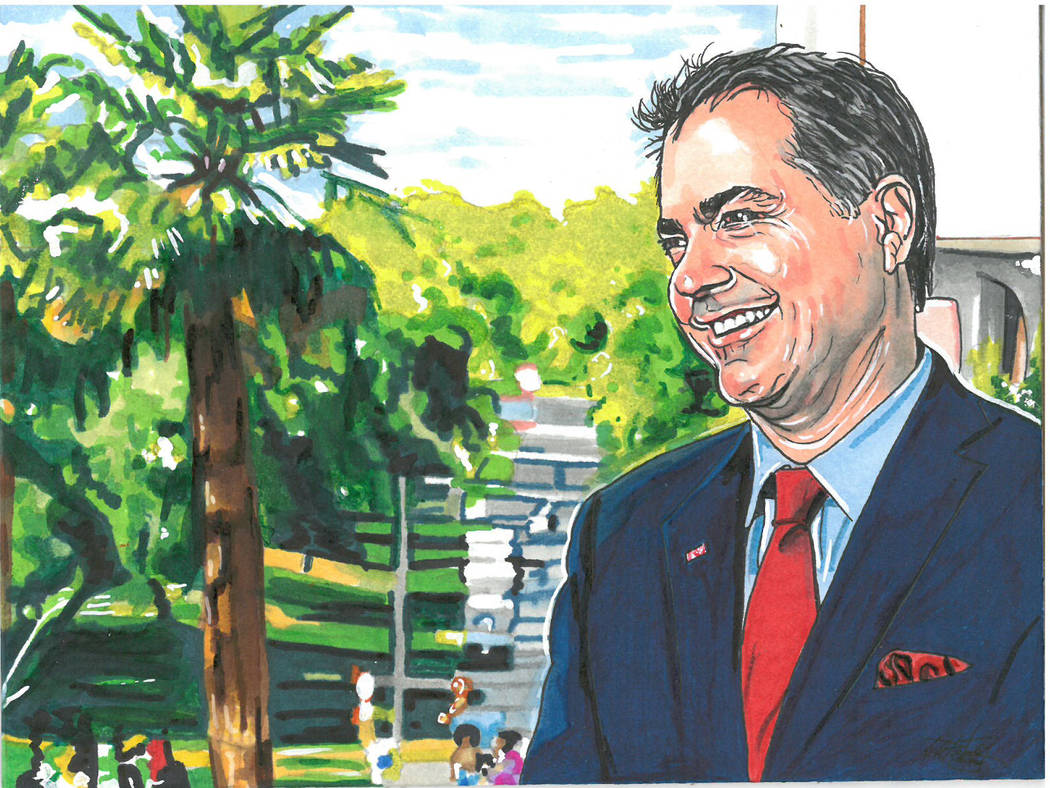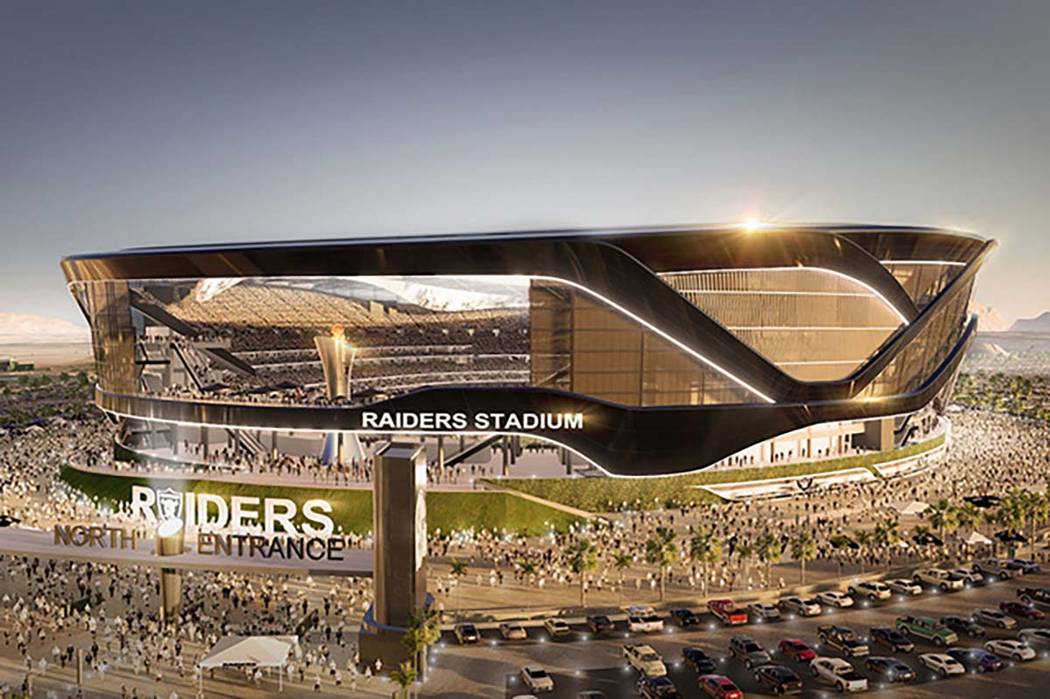UNLV football getting taste of life with Las Vegas stadium
The UNLV football team has gotten a taste of what life could be like once they’re playing in the new Las Vegas stadium.
The UNLV Athletic Department got a call from the University of California, Berkeley wanting to develop a home-and-home football series with the Golden Bears of the Pac-12 Conference.
And they want to be the first opponent UNLV plays once the Rebels move into the stadium for its 2020 football season.
“They literally want to be the first game in the stadium,” University President Len Jessup said in a recent interview about the status of a joint-use agreement with the Oakland Raiders on the stadium the team is building on 63 acres at Interstate 15 and Russell Road.
“We didn’t get those kinds of offers from Pac-12 schools for Sam Boyd Stadium,” Jessup said. “That’s a function of the new stadium.”
While most of the focus on the site, where ground was broken Nov. 13, has been on the Raiders, UNLV’s use of the $1.9 billion, 65,000-seat domed stadium was one of the primary reasons the Nevada Legislature in a special session in October 2016 approved a $750 million public contribution toward construction costs.
Regional benefits
Jessup sees the potential of the stadium not only for UNLV, but for all of Southern Nevada. For UNLV, it’s the vision of someday being bumped up to a top-tier athletic conference that will bring additional notoriety to the university.
“That’s just one example where it’s not even built yet and it’s already influencing the way Pac-12 schools are viewing UNLV even without the stadium being here,” Jessup said. “You can extrapolate from that and you can see what the effect is going to have on the entire city with the different kinds of events it’s going to draw, how people will view us differently as a global city with international soccer and things like that. It’s going to be really exciting to see how this unfolds.”
But for now, those are just dreams of what could be. Right now, there’s still work to be done to bring the joint-use agreement to the Las Vegas Stadium Authority in conformance with Senate Bill 1, the legislation authorizing the public’s contribution to the project.
Jessup said there were a number of “very lengthy” and “productive discussions” with the Raiders on the joint-use agreement.
“I think that we’re very close. The process has gone well, it’s been productive, Jessup said.
Many meetings
Jessup said the UNLV team has met face to face with their Raiders counterparts, team President Marc Badain and Dan Ventrelle, executive vice president and general counsel, “about a half-dozen times” and has had numerous conference calls and in-house conversations about the agreement that will spell out details of the ongoing relationship between the Raiders and the Rebels on access to the stadium and the university’s ability to make it look like a UNLV venue.
Work began last summer and isn’t expected to be completed until January or February.
“Everybody’s busy,” Jessup said of the current timeline. “They’ve got so many other things they need to get done. And they’re in the middle of a season and they’re managing a team and renegotiating contracts. … I think it’s just that there’s a lot of work to be done here in a short amount of time.”
Asked about what issues have been completed and what terms remain to be negotiated, Jessup was hesitant to provide details. But he did outline the approval process that lies ahead with the Nevada Board of Regents.
“I really don’t want to say what specifically are the remaining items because I don’t think that would be fair to anybody involved in the negotiating on this thing at this point,” Jessup said.
One area that isn’t a part of the conversation — the use of UNLV parking lots for fans on game days.
Two-step approval
“I also have to say that once we’re done with this part of the process, we’re not done, because ultimately, it would then go to our regents. Thom (Reilly) has committed to the regents that that would be in a two-step fashion, one meeting where we would report out on everything and they would get to digest it and react to it, and then they’d get a little bit of time and then we’d come back in a second meeting with any revisions that are necessary to be able to vote on it,” he said.
Jessup said there haven’t been any conversations about the Raiders participating in the regent meetings.
“I don’t know that we’ll need them at that point to do that, but it wouldn’t surprise me if the Raiders volunteered to want to do that and be present at the meeting because they’ve been helpful every step of the way,” he said.
Once the regents give the agreement its stamp of approval, it would go to the Stadium Authority. Final approval of the joint-use agreement by the authority is essential to completing the final development agreement that allows the Raiders to tap the $750 million in public funds.
Access to $750 million
The Raiders must also put in the first $100 million in construction before they can access the public money, which comes in the form of tax-exempt bonds to be paid off through a 0.88-percentage-point increase in Clark County’s hotel room tax. That room-tax increase has raised $29.3 million between March and September.
Jessup said he saw Badain and Raiders owner Mark Davis at the groundbreaking, which he described as “an incredible first-class event” and that everyone is eager to take the next step.
“I spoke with Marc Badain and with Mark Davis at the groundbreaking and we all agreed that we’re almost there,” Jessup said. “We’re just about to get this thing done, let’s go, let’s finish it off and then move on to building a stadium, designing it together and let’s figure out what our locker room is going to look like,” he said.
“The relationships are very positive, very collegial and I think we’re very close.”
Contact Richard N. Velotta at rvelotta@reviewjournal.com or 702-477-3893. Follow @RickVelotta on Twitter.
What SB 1 says about the joint-use agreement
Here are some excerpts from Senate Bill 1 describing the relationship between the Oakland Raiders and UNLV:
• The team or its subsidiaries must "provide for the accommodation of a sufficient number of dates to host at the project the regular and postseason home games of the University football team …"
• "Any National Football League event has priority of use of the project and the National Football League team has priority to use the project for its home games and priority over dates, stadium assets and the playing surface."
• "After the university has finalized the schedule of home games for its football team for the applicable season and the dates of those home games have been approved by the Stadium Authority, the date of a home game may not be changed to accommodate an event that is not a National Football League event without the approval of the university."
• "Establish a reasonable rent to be paid by the university for the use of the project for the regular and postseason home games of its football team, except that for each regular season home game of the football team, and not more than three other events selected by the university, the reasonable rent must not exceed the actual operational or pass-through costs, excluding any fixed costs, to host the game or event at the project."
• "The National Football League team must have simultaneous access to such areas of the project as are needed by the team to prepare for a home game of the team that occurs on the day following the date of the home game of the university football team, provided that such access must not impede or interfere with the use of, or access to, the project by the university."
• "Provide that the Stadium Authority has the discretion to resolve any disputes relating to the provisions of the lease agreement …"
UNLV's joint-use agreement negotiating team
• University President Len Jessup.
• Athletic Director Desiree Reed-Francois, an attorney who once worked with the Raiders and the NFL.
• Thom Reilly, the newly appointed chancellor of the Nevada System of Higher Education.
• Outside counsel Mandy Shavinsky, a partner with Las Vegas-based Snell & Wilmer.
• Daniel Etna, chair of the Sports Law Group for New York-based Herrick Feinstein, who has negotiated several sports-related business contracts.























